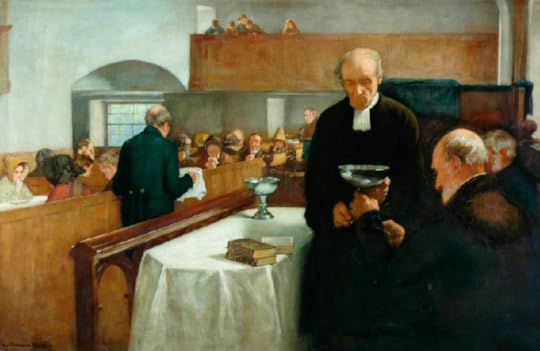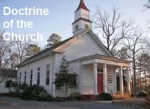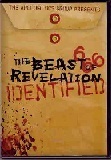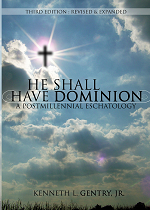PROPER COMMUNION (4)
 PMW 2024-084 by Kenneth L. Gentry, Jr.
PMW 2024-084 by Kenneth L. Gentry, Jr.
In my previous article on fencing the table I laid the foundations for considering the question before us. I introduced the idea of sacramental foundations their implications for fencing the table. Then I focused on the relationship of the sacraments to church government. Now we are finally ready to deal with the specific matter of partaking Communion.
SACRAMENTAL PARTAKING
Now I will draw out some biblical principles and directives regarding the careful fencing and partaking of the Lord’s Table.
First, the Lord’s Supper is intrinsically corporate
Although personal responsibilities fall upon the individual partakers of the Lord’s Supper (see next point below), we see clear and fundamental community overtones in it. Note the following:
(1) As I begin with these observations, we must remember that the first Lord’s Supper was established in the context of the Passover and took the place of a communal meal. Communion was designed to take the Passover’s place within the new Israel of God, the Church of Jesus Christ. This fact provides helpful background insights into the corporate setting and obligations of the sacrament.
The initial Passover was partaken in the houses of the Jews while still in Egypt and just before their exodus from bondage: “they shall take some of the blood and put it on the two doorposts and on the lintel of the houses in which they eat it” (Exo 12:7). This at-home partaking was necessary in light of the original circumstances of that Passover: Israel was not yet organized as a nation and the last plague on Egypt was fast approaching: “The blood shall be a sign for you on the houses where you live; and when I see the blood I will pass over you, and no plague will befall you to destroy you when I strike the land of Egypt” (Exo 12:13).
Nevertheless, even in those circumstances the Passover was a communal celebration designed for the corporate body of Israel. We see this in that all of the Jews in their various homes were simultaneously to slay their Passover lambs; hence we read: “the whole assembly of the congregation of Israel is to kill it at twilight” (Exo 12:6). In fact, in the Exodus 12 legislation itself we read of directives for future (post-Egypt) celebrations which show its formal, corporate, communal nature as over against any individualistic conception: “On the first day you shall have a holy assembly [i.e., gathering together] and another holy assembly on the seventh day; no work at all shall be done on them, except what must be eaten by every person, that alone may be prepared by you” (Exo 12:16).
 Christ’s Church (20 mp3 downloads)
Christ’s Church (20 mp3 downloads)
by Ken Gentry
An in-depth sermonic presentation of the doctrine of the church. This is vitally important today with the evangelical church not living up to its biblical calling
See more study materials at: www.KennethGentry.com
Furthermore, we must understand that the Passover celebration was not simply for a mass of individuals partaking simultaneously, but for the formal, organized body of Israel as such. The Passover directive clearly stated: “This is the ordinance of the Passover: no foreigner is to eat of it” (Exo 12:43). One had to be a “member” of Israel in order to partake with the assembly of Israel. In the next few verses we discover the remedy that allows for foreigners to partake the Passover: a foreigner may eat of it, if he “joined” Israel by entering into “membership” in Israel by means of circumcision: “But if a stranger sojourns with you, and celebrates the Passover to the Lord, let all his males be circumcised, and then let him come near to celebrate it; and he shall be like a native of the land” (Exo 12:48).
We see the concept of “membership” in Israel and even a “fencing” of the Passover in the following. Any Jew who neglected the Passover was to be “cut off from his people”: “The man who is clean and is not on a journey, and yet neglects to observe the Passover, that person shall then be cut off from his people, for he did not present the offering of the Lord at its appointed time. That man shall bear his sin” (Num 9:13). The very idea of being “cut off” demands that one first be a “member” of the body of Israel.
(2) Eventually, after Israel was established as a nation and settled in the land, the Passover was to be celebrated corporately in Jerusalem (rather than individually in personal homes). This further demonstrates the formal, communal nature of the sacrament: “You are not allowed to sacrifice the Passover in any of your towns which the Lord your God is giving you; but at the place where the Lord your God chooses to establish His name [i.e., Jerusalem], you shall sacrifice the Passover in the evening at sunset, at the time that you came out of Egypt” (Deut 16:1, 5–6; cp. 2 Chron 30:5, 13, 15; 35:1; etc.). The Passover (also known as the Feast of Unleavened Bread) was to be celebrated only in a “holy convocation” or worship assembly: “Then on the fifteenth day of the same month there is the Feast of Unleavened Bread to the Lord; for seven days you shall eat unleavened bread. On the first day you shall have a holy convocation; you shall not do any laborious work” (Lev 23:6–7). Clearly the Passover was not intended to be an individualistic, in-home sacrament, for it could be partaken only in Israel’s center of worship simultaneously with the mass of Israel in a holy convocation.
(3) Much later in Jesus’ own day the Passover continued to be celebrated corporately in a central location in Jerusalem. We read in Luke 2:41 that Jesus’ “parents used to go to Jerusalem every year at the Feast of the Passover” (cp. John 2:13, 23; 11:55). In fact, Jesus planned his final Passover in Jerusalem with his disciples: “He said, ‘Go into the city to a certain man, and say to him, “The Teacher says, ‘My time is at hand; I am to keep the Passover at your house with My disciples’” (Matt 26:18; cp. Mark 14:14; Luke 22:11). At this final communal Passover of Jesus’ ministry, he establishes the Lord’s Supper with his disciples, desiring to eat it with them gathered together (Luke 22:15–21).
From these first three points we may surmise by “good and necessary consequence” (WCF 1:6) that some sort of roll or registration was necessary for partaking the Passover:
(a) We see this in specific requirements regarding Passover lambs: The Jews were commanded to prepare only an exact amount of Passover lambs according to how many should eat: they must take a lamb “according to the number of persons in them; according to what each man should eat” (Exo 12:3–4). This is very important in that they must not “leave any of it over until morning” (Exo 12:10).
 Dispensational Distortions (3 downloadable mp3s)
Dispensational Distortions (3 downloadable mp3s)
by Ken Gentry
Reformed introduction to classic dispensationalism, with analysis of leading flaws regarding the Church, kingdom, redemptive history, and Christ. Helpful for demonstrating errors to dispensationalists.
See more study materials at: www.KennethGentry.com
(b) We see this in the general importance of formal genealogies in Israel: formal genealogies were carefully kept among the Jews, until they were destroyed at the collapse of the temple in A.D. 70. One examples of these genealogies is found in the registering of priests and their families (2 Chron 31:17–18). We see the importance of genealogies throughout Israel’s history in genealogies in 1Chronicles 5 and as well as Matthew 1. In Matthew 1 Jesus’ genealogy is given and includes not only biological Jews but non-Jews who became part of (“joined”) Israel (e.g., Gentiles Tamar, Rahab, Ruth, and Bathsheba, Matt 1:3, 5, 6). Ultimately though, the foundational image of formal registration is God’s “book” (e.g., book of life) which speaks of persons either being registered in it (Isa 4:3; Dan 12:1; Mal 3:16; cp. Rev 21:27) or deleted from (Exo 32:32; Psa 69:28; cp. Rev 3:5).
(c) We see this in the general practice in which one may be formally “cut off” from Israel: for instance, particular legislation prohibited production of the special priestly anointing oil: “whoever shall mix any like it [special holy anointing oil, vv. 31–32], or whoever puts any of it on a layman, shall be cut off from his people” (Exo 30:33, 38; cp. Lev 7:20–21, 25, 27; 17:14; etc.).
(d) We see this in the particular legislation which allowed or excluded persons from partaking the Passover in Israel. Earlier we saw that a newly-received foreigner could be allowed access to the Passover by undergoing Israel’s initiation rite, circumcision (Exo 12:48; see above). Not only so but a circumcised Jew (a member of Israel) could be “cut off” from Israel for either breaching Passover (the Feast of Unleavened Bread) regulations or intentionally neglecting to partake of Passover:
“Seven days you shall eat unleavened bread, but on the first day you shall remove leaven from your houses; for whoever eats anything leavened from the first day until the seventh day, that person shall be cut off from Israel.” (Exo 12:15)
“Seven days there shall be no leaven found in your houses; for whoever eats what is leavened, that person shall be cut off from the congregation of Israel.” (Exo 12:19)
“But the man who is clean and is not on a journey, and yet neglects to observe the Passover, that person shall then be cut off from his people, for he did not present the offering of the Lord at its appointed time. That man shall bear his sin.” (Num 9:13)
(e) We see this in the prohibition of certain Jews from the formal “assembly of the Lord” in worship. In Deut 23:2 God’s Law ordains that “no one of illegitimate birth [Heb.: mamzēr] shall enter the assembly of the Lord; none of his descendants, even to the tenth generation, shall enter the assembly of the Lord.” This requires some sort of roll in order to determine the eleventh generation so that these may enter.
(4) Paul speaks of the Lord’s Supper as a corporate reality: “Since there is one bread, we who are many are one body; for we all partake of the one bread” (1 Cor 10:17). Thus, the Supper reflects the corporate one body composed of many members.
(5) Paul highlights the corporate sharing in the Lord through the Supper rather than an individualistic phenomenon:
“Is not the cup of blessing which we bless a sharing in the blood of Christ? Is not the bread which we break a sharing in the body of Christ?” (1 Cor 10:16).
The idea of “sharing” (Gk.: koinonia) suggests mutual, communal sharing together in Christ. In Acts 2:44 and 4:32 we learn that the first-century church communally shared (Gk.: koinos) their property. Paul uses the Greek verb koinoō in 2 Cor 6:14 and 8:4, which verses speak of inter-body sharing. Thus, regarding the Lord’s Supper, Christ’s corporate body (the church) shares together in the Lord.
 Prophecy Studies (4 downloadable mp3s)
Prophecy Studies (4 downloadable mp3s)
by Ken Gentry
Dispensationalism dominates the evangelical market regarding eschatological discussions. But dispensationalism is radically mistaken regarding the eschatology of Scripture. In this series not only is dispensationalism analyzed, but also the postmillennial eschatology of the Psalms, and a preterist analysis of Revelation.
See more study materials at: www.KennethGentry.com
(6) Paul notes that the church as a body has been experiencing difficulties because of the abuse of the
Supper: “For this reason many among you are weak and sick, and a number sleep. But if we judged ourselves rightly, we should not be judged” (1 Cor 11:30–31). The plural “ourselves” suggests an organic conception of the church which is suffering because of widespread abuse of the sacrament.
Second, the Lord’s Supper engages self-examination
The fact of Paul’s urging individual self-examination suggests to some Christians that this is the sole requirement of the Supper: an individual’s personal right without reference to notion of corporate responsibility included. Paul certainly gives directives regarding individuals partaking:
“whoever [Gk.: hos, singular relative pronoun] eats [esthie, singular verb] the bread or drinks the cup of the Lord in an unworthy manner, shall be [estai, singular verb] guilty of the body and the blood of the Lord. But let a man [anthrōpos, singular] examine [dokimazetō, singular verb]] himself [heauton, singular], and so let him eat [esthietō, singular verb] of the bread and drink of the cup. For he who eats and drinks [esthiōn kai pinōn, singular verbs] judgment to himself if he does not judge [diakrinōn, singular participle] the body rightly” (1 Cor 11:27–29).
But we must understand that Paul was writing to a church — not to individuals, not to a Timothy or a Titus regarding their own personal communion. He is giving directions to the church at Corinth regarding its own members and their participation in the supper. Thus, the individuals deserving rebuke were already accountable to a church and its officers. Remember that Paul is rebuking the church for not governing its members properly, noting that he had nothing to do with those outside (1 Cor 5:1–13).
Therefore, these are obviously inside the church and consequently are members under the authority of its elders (cp. 1 Pet 5:2; Heb 13:17; 1 Tim 3:5). He is pressing the additional obligation of self-examination upon individual members while they participate in the corporate administration of the Supper. The Lord’s Supper is not a formalistic ritual to be taken thoughtlessly by rote. The passage warns of the necessity of thoughtful and reverential participation, not open participation unguarded by the officers of the church.
Third, forbidding from the Lord’s Table believers who are not members of a church does not preclude their spiritually feeding on Christ
Some Christians complain that to bar partaking the Lord’s Supper to a believer in Christ who is not a member of a local church bars him from communion with Christ. However, note the following:
In the first place, the problem is easily solved by simply joining a church. This is, after all, an obligation for believers that church officers should promote (see brief statement below on the biblical obligation to church membership). In the second place, Christians may feed upon Christ spiritually even apart from the sacrament. Any person may individually feed upon Christ spiritually in his heart at any time — as he prays, meditates on Scripture, worships, and so forth. We see this in Jesus’ general, public statement in John 6:54: “He who eats My flesh and drinks My blood has eternal life, and I will raise him up on the last day.” This eating and drinking language speaks of taking Christ into one’s life, that is, it involves believing in Christ: “Jesus said to them, ‘I am the bread of life; he who comes to Me shall not hunger, and he who believes in Me shall never thirst’” (John 6:35).
Thine Is the Kingdom
(ed. by Ken Gentry)
Contributors lay the scriptural foundation for a biblically-based, hope-filled postmillennial eschatology, while showing what it means to be postmillennial in the real world.
See more study materials at: www.KennethGentry.com
As those who love the Church of our Lord Jesus Christ, our concern should be: why would someone who professes Christ not want to join the visible church? If he is a believer why does he not want to come under the authoritative oversight of the local church and its God-ordained officers? And if he does not want to join the visible church and come under its God-ordained authority, why is he concerned to partake of the church’s visible sacrament?
Stay tuned. I will present my fifth and final article on communion in my next article.
Click on the following images for more information on these studies:



Kenneth L. Gentry Jr.'s Blog
- Kenneth L. Gentry Jr.'s profile
- 85 followers



